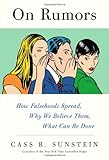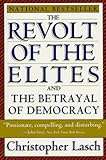The Ministry of Truth
Posted in Books & Reading, Politics on October 8th, 2009
On Rumors: How Falsehoods Spread, Why We Believe Them, What Can Be Done
This is the latest book – it’s actually more of a monologue – by Cass Sunstein, President Obama’s new Regulatory Czar. In it Obama’s new chief of the White House Office of Information and Regulatory Affairs calls for the end of free speech in this new, Internet Age.
This is, due to Sunstein’s new job, cause for worry.
In his monologue Sunstein contends that rumors threaten democracy by undermining public confidence in government, though he admits in the opening pages of On Rumors that there is no good definition for what constitutes a rumor.
What can we do to protect ourselves against the harmful effects of false rumors? As we shall see, part of the answer lies in recognizing that a ‘chilling effect’ on those who would spread destructive falsehood can be an excellent idea.
~*~
There is no settled definition of rumor, and I will not attempt to offer one here.
— Cass Sunstein
On Rumors, Pg 5
Mr. Sunstein admits that there is no adequate definition of rumor that he could use in his treatise, but wants the government to enact a “chilling effect” on rumors on the Internet – as a start no doubt. Later in work he claims that he is not calling for censorship, but thinks that there’s too much freedom of speech on the Internet.
Any marketplace requires standards and ground rules; no market can operate as a free-for-all. It is not obvious that the current regulatory system for free speech — the current setting of chill — is the one that we would or should choose for the Internet era.
— Cass Sunstein
On Rumors, Pg 78
That “setting of chill” within the current regulatory system for free speech was defined in the 1st Amendment of the US Constitution, a document that Cass Sunstein is obviously not particularly fond of.
![]() It should also be noted that Sunstein contextualized his work with references to Obama’s campaign and the work was little more than a threat against Conservative websites.
It should also be noted that Sunstein contextualized his work with references to Obama’s campaign and the work was little more than a threat against Conservative websites.
Since President Obama installed Sunstein in a position to carry out that threat, Sunstein must be classed as a clear and present danger to America’s liberty and freedom of speech.
When the man that President Obama hand-picked to head the agency in the federal government that reviews draft regulations under Executive Order 12866 and develops and oversees the implementation of government-wide policies in the areas of information technology, information policy, privacy, and statistical policy is afraid of freedom of speech – especially on the internet, the seeds of tyranny have been well and truly planted – in the fecund soil of Obama’s government.
It seems that President Obama has found in Cass Sunstein the perfect Hierophant for his Ministry of Truth. One is forced to wonder, if one is American, how long we have before Inquisition begins.



